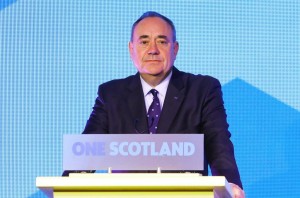Scotland says No to Independence - but Yes to devolution

Marta Pancini, BA Development Studies and Politics
The lead up to Scotland’s vote on independence on 18 September saw the rise of fears and hopes on a variety of issues, from more obvious ones such as EU membership of Britain and the potential currency of an independent Scotland to less predictable ones such as the future of Scotland’s classical music scene. In the end, Scotland chose to remain part of the UK, with a narrow majority of 55% rejecting the independence proposal on a record-high turnout of 84.5% overall and over 90% in some areas.
Not surprisingly, however, from the very idea of an independent Scotland has arisen hopes of independence in other regions of the world with strong separatist movements, such as Catalonia. Scottish flags joined Catalonian ones in a rally for independence held in Barcelona only a few days before the Scottish referendum, and Catalonian activists have pledged to keep fighting for independence, despite the outcome of the Scottish referendum. Separatist movements in China, Ukraine and Kurdistan, among others, also closely monitored the campaign, with one Kurdistan Tribune columnist declaring that “the British are exercising the old colonialist tongue to control the minds and dampen the aspirations of Scottish people who want to vote yes”.
Back in Britain, the outcome of the vote seemed uncertain until the end, with the Yes and No campaigns faring very similarly in most polls. On Wednesday 10 September David Cameron, Nick Clegg and Ed Miliband – whose UK parties jointly led the ‘No’ campaign Better Together – rushed to Scotland in an emergency attempt to campaign against Scottish independence, after a poll suddenly putthe Yes vote – for Scottish independence – ahead. A few days later, on Sunday 14 September, Opinium and ICM figures gave conflicting results, with Opinium putting the No vote first with 53% of votes and ICM putting the Yes vote first with 54% of votes (both figures exclude ‘don’t knows’; the ICM sample was smaller).

First Minister Alex Salmond accepted that Scotland is not ‘yet’ decided on independence, and reminded the British government of their pledge for the devolution of more powers over tax, spending and welfare in the case of Scotland remaining in the UK. This is likely to lead to devolution of more powers to other regions of the country as well.
Deputy Prime Minister Nick Clegg spoke last Friday of the beginning of “a phase of much greater decentralisation, devolution and autonomy for all the communities that make up the UK”. This is a reflection of the feeling, which grew stronger and stronger during the campaign period, that whatever the outcome of the referendum the status quo would not be maintained; Guardian journalist Andrew Rawnsley went so far as to declare that “whatever the result of the Scottish referendum, Alex Salmond [would] be the winner”. Another achievement of the Yes campaign, as Salmond put it, was the mobilisation and politicisation of sectors of society which had never before been involved in politics.
Having led the Yes Campaign and served as Scottish First Minister since 2007, Alex Salmond has announced he will stand down as leader of the SNP in November, after leading the nationalist party for 20 years.




